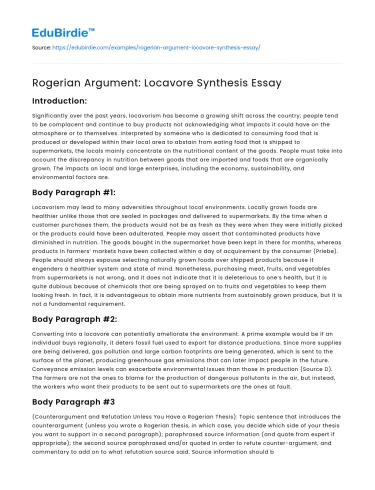Introduction:
Significantly over the past years, locavorism has become a growing shift across the country; people tend to be complacent and continue to buy products not acknowledging what impacts it could have on the atmosphere or to themselves. Interpreted by someone who is dedicated to consuming food that is produced or developed within their local area to abstain from eating food that is shipped to supermarkets, the locals mainly concentrate on the nutritional content of the goods. People must take into account the discrepancy in nutrition between goods that are imported and foods that are organically grown. The impacts on local and large enterprises, including the economy, sustainability, and environmental factors are.
Body Paragraph #1:
Locavorism may lead to many adversities throughout local environments. Locally grown foods are healthier unlike those that are sealed in packages and delivered to supermarkets. By the time when a customer purchases them, the products would not be as fresh as they were when they were initially picked or the products could have been adulterated. People may assert that contaminated products have diminished in nutrition. The goods bought in the supermarket have been kept in there for months, whereas products in farmers’ markets have been collected within a day of acquirement by the consumer (Priebe). People should always espouse selecting naturally grown foods over shipped products because it engenders a healthier system and state of mind. Nonetheless, purchasing meat, fruits, and vegetables from supermarkets is not wrong, and it does not indicate that it is deleterious to one’s health, but it is quite dubious because of chemicals that are being sprayed on to fruits and vegetables to keep them looking fresh. In fact, it is advantageous to obtain more nutrients from sustainably grown produce, but it is not a fundamental requirement.
Save your time!
We can take care of your essay
- Proper editing and formatting
- Free revision, title page, and bibliography
- Flexible prices and money-back guarantee
Body Paragraph #2:
Converting into a locavore can potentially ameliorate the environment. A prime example would be if an individual buys regionally, it deters fossil fuel used to export far distance productions. Since more supplies are being delivered, gas pollution and large carbon footprints are being generated, which is sent to the surface of the planet, producing greenhouse gas emissions that can later impact people in the future. Conveyance emission levels can exacerbate environmental issues than those in production (Source D). The farmers are not the ones to blame for the production of dangerous pollutants in the air, but instead, the workers who want their products to be sent out to supermarkets are the ones at fault.
Body Paragraph #3
(Counterargument and Refutation Unless You Have a Rogerian Thesis): Topic sentence that introduces the counterargument (unless you wrote a Rogerian thesis, in which case, you decide which side of your thesis you want to support in a second paragraph); paraphrased source information (and quote from expert if appropriate); the second source paraphrased and/or quoted in order to refute counter-argument, and commentary to add on to what refutation source said. Source information should be a minimum of three sentences for counterargument and refutation. Commentary should focus on refuting the counterargument beyond what your second source said.
Conclusion:
Topic sentence that does not repeat the thesis, but, instead, moves it forward to the next step. Conclusion should be around 5 sentences. Do not recapitulate or summarize what you have already said above. Instead, discuss the future implications (e.g., what further benefits or consequences could occur with locavorism), what is currently going on with locavorism that seems to favor your argument or what needs to happen next (AKA call to action) in order for more people to espouse or eschew locavorism. You can also conclude your hook if it helps extend your main argument.
Works Cited
- Chung, Emily. “Your meals are speeding up climate change, but there’s a way to eat sustainably.” CBC News, 04 December 2018, https://www.cbc.ca/news/technology/food-climate-change-carbon-footprint-1.4930062.
- Priebe, Maryruth. “Benefits of Being a Locavore.” EcoLife A Guide to Green Living, http://www.ecolife.com/health-food/eating-local/benefits-of-locavore-diet.html
- Salmon, Felix. “How Locavores Could Save the World.” Foreign Policy, 26 February 2010, https://foreignpolicy.com/2010/02/26/how-locavores-could-save-the-world/






 Stuck on your essay?
Stuck on your essay?

